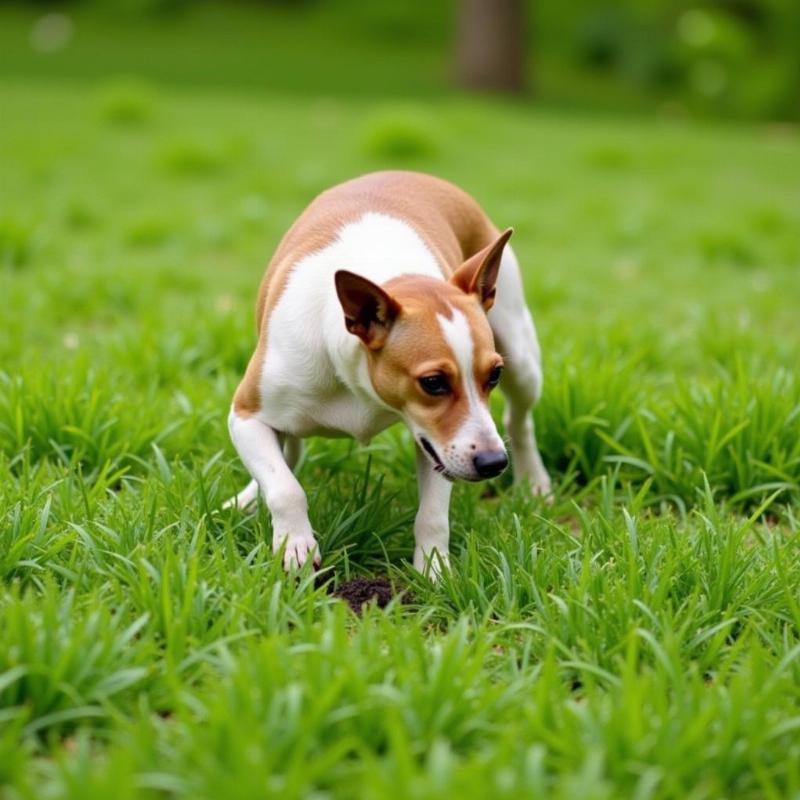Dealing with dog poop on your beautiful lawn is a common frustration for many American pet owners. Nobody wants to step in it, and it certainly doesn’t add to your curb appeal. But how do you stop this unwelcome behavior? This article will provide you with proven strategies to address the root cause of the problem and reclaim your pristine lawn.
Understanding Why Dogs Poop on the Lawn
Before we dive into solutions, it’s crucial to understand why dogs choose your lawn as their bathroom. Dogs may poop on your lawn due to habit, territorial marking, dietary issues, or simply because it’s a convenient spot. Identifying the underlying reason is the first step toward resolving the issue. Some dogs prefer the feel of grass on their paws, while others might be attracted by the scent of previous droppings.
 Dog pooping on a green lawn
Dog pooping on a green lawn
Effective Strategies to Stop Dogs Pooping on Your Lawn
Addressing this issue requires a multi-pronged approach. Here are some effective strategies to consider:
Establish a Designated Potty Area
Creating a specific area for your dog to relieve themselves is key. Choose a spot away from your main lawn area, perhaps in a corner of your yard or a designated dog run. Consistency is vital; take your dog to this spot regularly, especially after waking up and after meals. Reward them with praise and a treat when they eliminate in the designated area.
Clean Up Immediately
Dog poop attracts more dog poop. The scent encourages repeat offenses. Clean up any existing poop on your lawn immediately using a pooper scooper and disposable bags. Regularly cleaning your yard will help eliminate the scent markers that attract your dog to the area.
Repellents and Deterrents
Several dog repellent products are available on the market. These can be sprays, granules, or electronic devices that emit high-frequency sounds. Choose a repellent that is safe for your dog, your lawn, and the environment. Follow the product instructions carefully.
Train Your Dog with Positive Reinforcement
Positive reinforcement training is essential. Reward your dog when they eliminate in the designated potty area. Use verbal praise, treats, or even a favorite toy to reinforce the desired behavior. Consistency and patience are key to successful training.
Dietary Considerations
Sometimes, dietary issues can contribute to frequent bowel movements. Consult your veterinarian to ensure your dog’s diet is appropriate for their age and breed. A balanced diet can help regulate their digestive system and reduce the frequency of pooping.
Addressing Stubborn Cases
If your dog continues to poop on the lawn despite your efforts, consult with a professional dog trainer or a certified applied animal behaviorist. They can provide tailored guidance and address any underlying behavioral issues. Remember, patience and consistency are essential for success.
Conclusion
Stopping your dog from pooping on the lawn requires a combination of training, management, and environmental modification. By implementing the strategies outlined in this article, you can reclaim your lawn and enjoy a clean, poop-free outdoor space. Remember, consistency and positive reinforcement are crucial for long-term success.
FAQ
-
How often should I clean my yard of dog poop? Ideally, clean it daily to eliminate attracting scents.
-
What are some safe dog repellents? Citrus-based sprays and certain essential oils are generally safe, but always check the label.
-
How long does it take to train a dog to use a designated potty area? It varies, but with consistency, it can take a few weeks to a few months.
-
What if my dog still poops on the lawn despite training? Consult a professional dog trainer or behaviorist for personalized guidance.
-
Can my dog’s diet affect how often they poop? Yes, a balanced diet can help regulate their digestive system.
-
Are there any health risks associated with dog poop on the lawn? Yes, dog feces can contain parasites and bacteria harmful to humans and other animals.
-
What if my neighbor’s dog poops on my lawn? A polite conversation with your neighbor is usually the best first step.
Quote from Dr. Emily Carter, DVM: “Establishing a routine and rewarding desired behavior are crucial for successful potty training. Patience and consistency are key.”
Quote from Sarah Miller, Certified Dog Trainer: “Addressing the underlying cause of the behavior is essential for long-term success. Don’t give up!”
Related Articles
Beautdogs.us is your premier resource for all things dog-related in the USA. We offer expert advice on dog breeds, care, and product recommendations. Whether you’re a new dog owner or a seasoned pro, Beautdogs.us provides reliable information and resources to help you and your furry friend thrive. Contact us at [email protected] or +1 501-555-7529. We look forward to helping you!